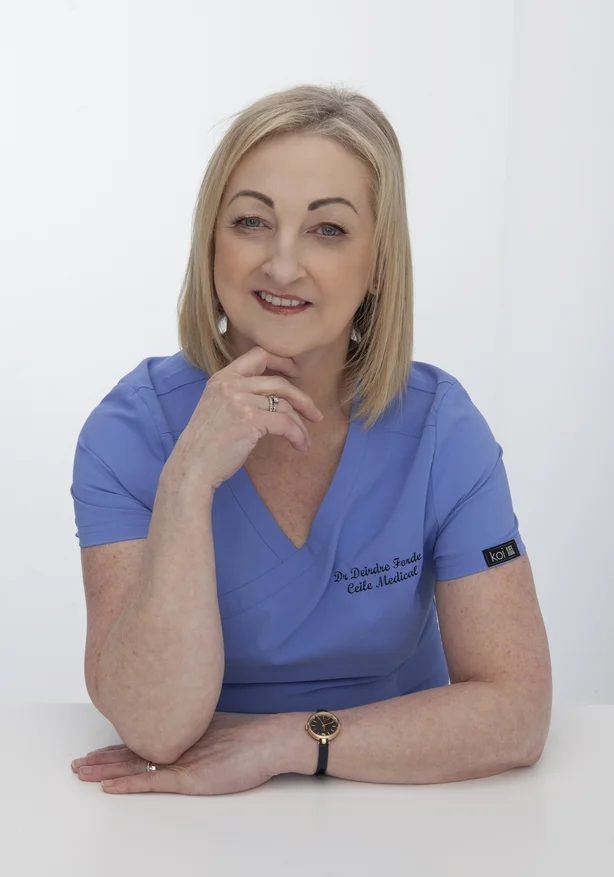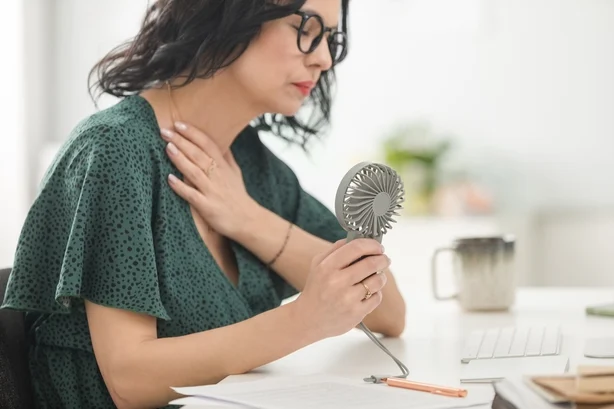There's an assumption that if you're a woman in a heterosexual relationship or marriage going through menopause, you'll have a partner who can step in. But that isn't always a guarantee.
Menopause can put "a huge strain" on relationships, Dr. Deirdre Forde - founder of Céile Medical in Athlone, the first dedicated Menopause Clinic in the Midlands - says, heterosexual or not.
"There's a lot of men who don't know about menopause, don't want to know about menopause and their woman, and their relationship becomes strained because she's turning into a crazy person and he doesn't know who she is anymore.
"And all of a sudden then they start to drift. So when they start to drift then, there's nothing to talk about anymore. Sure, a lot of them end up getting divorced."

"I was one of the one such person", Forde says, adding that she got divorced at 44, six years after starting menopause.
When she started menopause in her late 30s, Forde became gripped by what she calls an "irrational anxiety".
"I describe it like a washing machine, churning in your stomach, that just won't stop", says Forde. "I just wanted to detach my head for my body and make it stop."
Now, imagine you're a menopausal woman or a trans man in a relationship with another menopausal person. Who steps in to pick up the slack then?
Forde has opened up her Athlone practice to LGBT people going through menopause by organising free information events to offer support and advice, on 13 and 15 June.

"We need to talk about menopause as people who are going through menopause, as opposed to women going through menopause", she says. "I want to get rid of that stigma. There's nobody judging you. You are a person like everybody else, and you are going to go through this transition."
How we talk about the menopause has shifted radically in recent years, both globally and at home. A notable watershed moment in this shift was when scores of Irish women contacted Liveline with their often anguished accounts of menopause for five days straight, releasing years of suppressed pain.
Compounding this has been a glut of new research into the once mysterious part of a woman's life. This also backed up what many women had been saying in no uncertain terms: 55% of Irish women described menopause and perimenopause as a negative experience, compared to 22% calling it positive.
On top of that, an overwhelming majority of women (93%) agreed on menopause having a significant impact on a woman's life.
Menopause is defined as having had no period for 12 months, or if a woman has no ovaries due to surgery. It's caused by a drop in the production of key hormones estrogen, progesterone, and testosterone. It can span anywhere from four to 11 years and can bring on symptoms ranging from night sweats, mood swings and brain fog, to disrupted sleep, a burning sensation in the mouth and vaginal dryness.

Depending on the person, the stakes are undeniably high when it comes to untreated menopause, Forde says. Of course, there will always be some who practically sail through the experience, barely noticing a change. But the majority will undergo often seismic shifts in their physical and mental health. Research shows that fluctuating hormones can even have a lasting effect on the brain's structure.
"You're going to get women who just don't feel themselves anymore, who don't know who they are anymore. They feel that they can't work. They feel that they can't contribute to society anymore. Their brain is foggy and all of that. But they just feel worthless."
In some cases, those affected can become suicidal*, she says. People living with preexisting mental health conditions are particularly at risk.
"You've really got to watch a woman who, all of a sudden, is changing. Her mood is changing. Her mood swings are horrendous and her rage is terrible. She's not sleeping and she has uncontrollable anxiety. She's a menopausal woman and she needs help."

Finding the right support during menopause can still be challenging, particularly for LGBT people, she adds.
Although she herself hasn't treated any trans men presenting with menopause, she stresses that, "it is going to happen". "I am now 64, so I won't be doing this forever. But the new doctors coming on board who are hopefully going to be treating an awful lot of people with menopause, they're going to see it.
"I suppose trans people need to be aware. Trans men who are born with a uterus or who are born female, they need to be aware that they're going to face this in the future."
Forde's aim isn't to scaremonger, but to illuminate the reality of what many people experience. The hope is that in doing so, generations of people can prepare for the shift. There are already 600,000 menopausal women in Ireland, and by 2030 it is estimated that there will be 1.1 billion menopausal women on the planet.
Increased research and a greater understanding of hormone replacement therapy (HRT) and other treatments has made managing menopause considerably easier for many people.

Although a 1990s study - the Women's Health Initiative, which set out to examine the link between HRT and cardiovascular disease and studied the health of 160,000 postmenopausal women - skewed public perception against HRT, suggesting that it caused breast cancer, greater research has now shown that such risks are low for healthy women under the age of 60 and HRT is still a profoundly helpful treatment option for many women.
With the right treatment, Forde says, "You've got the benefit in that you've got your quality of life back. You're able to function as a person in this society. You're able to work, you're able to be happy."
To register for the free sessions on Saturday 15 June at 11am and 3pm email info@ceilemedical.ie with your name and age.
*If you are affected by any of the issues raised in this article, you can contact The Samaritans (phone: 116123), or Pieta House (1800 247 247).
Disclaimer: The copyright of this article belongs to the original author. Reposting this article is solely for the purpose of information dissemination and does not constitute any investment advice. If there is any infringement, please contact us immediately. We will make corrections or deletions as necessary. Thank you.






